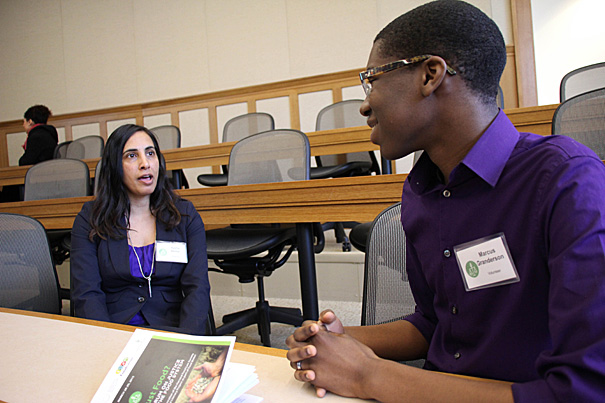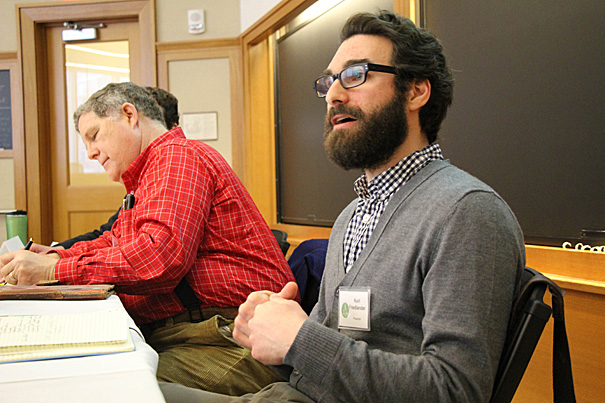
“We are all here because we want to see a more inclusive food movement,” said Harvard Law School Dean Martha Minow in her opening remarks at “Just Food?” this past weekend.
Photos by Leena Raza
A focus on food
Law School forum mines ways to protect, improve what we eat
The Harvard Food Law Society and the Food Literacy Project hosted the “Just Food? Forum on Justice in the Food System” at Harvard Law School (HLS) recently.
Margiana Petersen-Rockney, director of the Food Literacy Project, and Alexandra Jordan, a second-year student at HLS, organized the forum under Harvard’s yearlong Food Better initiative, which was created to discuss issues surrounding what we eat.
The forum, the first of its kind at Harvard, welcomed more than 500 attendees and more than 80 presenters, and included panels, workshops, keynote talks, and informal networking time. According to the “Just Food?” website, the gathering on
March 28-29 aimed to “bring together scholars, activists, practitioners, and other authorities to discuss the growing concern that our methods of production, marketing, processing, distributing, and consuming food are not equitable, just, healthy, or sustainable for our communities.”
“Justice requires that there be a possible vision of food quality and availability,” said HLS Dean Martha Minow, who is also the Morgan and Helen Chu Professor of Law, in her welcoming address. “We are all here because we want to see a more inclusive food movement. We are all consumers, we all have a say, and we challenge you to be an active participant.”
Here are overviews for some of the panels, which ranged from discussions of religion and food, to the effects of the quinoa market, to universities’ responsibilities, to working with low-income consumers:
#quinoaguilt: Problems and Solutions for Conscientious Consumers
Pilar Eguez, a postdoctoral fellow at the University of Illinois, whose research focuses on “the relationships between nutrition, lifestyle factors, and chronic disease among aging populations in Latin America,” discussed the importance of understanding basic global food politics and the elements of racism and colonialist consumer attitudes that affect the global market, and trade between developed and developing countries. Topics included the “gentrification” of the food system and an emphasis on changing local food systems, as shown in various case studies. Eguez encouraged the attendees to study anthropology as a way to empower individuals to move from cultural appropriation to cultural appreciation in the food system.


Nuri Friedlander (right) emphasized the importance of understanding individual values such as Islamic dietary laws which many people bring to their decisions on food.
Photos by Leena Raza
Faith and Food Justice: A Workshop
Peter Buck, an interfaith program representative with the group Equal Exchange, Harvard Islamic Society chaplain Nuri Friedlander, and the Rev. John Millspaugh, executive director of Beyond Carnism, reflected on ways of mobilizing and engaging faith communities with the food justice movement. Buck presented on fair trade, highlighting that 10 percent of Equal Exchange’s sales are to faith communities and noting that the group has more than a dozen partnerships with religious communities to support small farmers.
Friedlander emphasized the importance of understanding individual values such as Islamic dietary laws, which many people bring to their decisions on food. Millspaugh explored the power of cultivating humility and collaboration to effect change.
The Role of the University in Food Justice
Sophie Ackoff of the National Young Farmers Coalition, Simca Horowitz of Massachusetts Farm to School, and Anim Steel, executive director of the Real Food Challenge, discussed ways that a liberal arts education can play a role in fostering food justice. Ackoff said that 78 percent of young farmers did not grow up on farms, but rather learned about cultivation during their college years.
Universities, she emphasized, are useful hubs for an agricultural education that will be complemented by the broad scope of a liberal arts education. Horowitz described how Massachusetts Farm to School seeks to enable institutions to make sustainable, local food supply choices.
Steel discussed Real Food Challenge’s method of empowering and educating students to enact change within their universities’ food system practices. Real Food aims to shift 20 percent of universities’ budgets from negative to positive food choices by 2020, through the action of student leaders.
Bridging the Gap: How to Make Just Food Affordable for Farmers to Grow and Consumers to Buy
James Harrison of The Food Project, Jennifer Hashley of the New Entry Sustainable Farming Project, Karyn Moskowitz of New Roots, and Peter Rogers, Gordon McKay Professor of Environmental Engineering at the Harvard School of Engineering and Applied Sciences (SEAS) and professor of city and regional planning at Harvard, explored successful models of effectively connecting farmers to low-income urban consumers. The Food Project works to help people grow their own food, connect farms to neighborhoods, and leverage public and private resources. Other ideas included New Roots’ method of using churches as hubs to organize community members around fresh, local food buying, and New Entry’s commitment to educating the next generation of farmers.
To learn more about Food Better and the forum, visit its website. Video and sound recording of panels will be available in the next few weeks.





